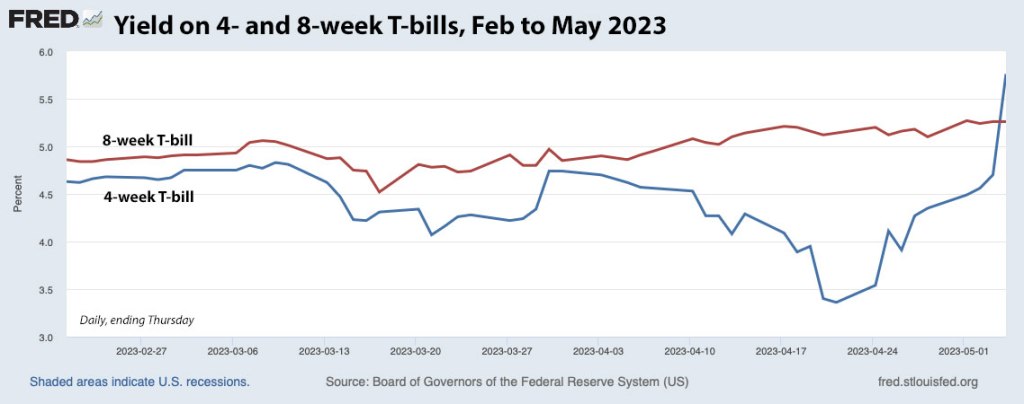By David Enna, Tipswatch.com
I’ve just returned to Quito, Ecuador’s capital city, after spending five days in the Amazon jungle at a surprisingly pleasant eco lodge on a tributary of the Napo River.
The good news: We saw four different types of monkeys, 40+ species of colorful birds, gorgeous wild plants, a bunch of giant rodents and two tarantulas. The bad news: My internet access was extremely limited and even now is quite slow. Next week will probably get much worse, so I thought I’d better take the time now to catch up on financial events of the last week.
The Fed
I haven’t been able to closely follow the Fed’s actions or listen to Powell’s press conference. But from what I can gather, the Fed decided to raise its federal funds rate 25 basis points, to a range of 5.00% – 5.25% and then call a halt, at least temporarily.
I like this move and it is what I expected as the United States continues slogging through a slow-motion banking crisis. It does mean that short-term interest rates will be slightly higher than current U.S. inflation (now at 5.0% annually). Of course, this week’s April inflation report could change that equation. I think the Fed knows troubled times are coming, because of …
The debt-limit crisis
I saw that the Treasury Secretary Janet Yellen theorized that the x-date for hitting a hard debt limit could come as soon as June 1, or possibly early July. That was earlier than expected and not good news. Congress remains deadlocked and no compromise looks possible. A more likely result will be a temporary extension of the debt limit, possibly through September, to allow more time for serious talks.
This debt limit fiasco seems to have had little effect — so far — on the U.S. stock market, which finished last week down about 0.8%. Not bad. Of course, the Fed decision to halt interest rate increases was a counter-balancing positive for the market.
T-bill yields
I have written about how similar debt-ceiling events in 2011 and 2013 caused brief disruptions in short-term Treasury yields, with investors demanding higher yields because of the potential turmoil. In recent weeks, we saw this brewing right before our eyes with investors pouring into 4-week T-bills (in theory maturing before the crisis) and demanding higher yields on 8-, 13- and 26-week T-bills, which looked likely to get caught in the political mess.
Now, with Yellen announcing a potential x-date of June 1, that situation has reversed, and the 4-week T-bill is now most at risk. The result: Last week’s 4-week Treasury auction got an investment rate of 5.964%, up an incredible 206 basis points from 3.905% the week before.
This trend is likely to continue — and worsen — as a true hard debt limit looms over the market in coming weeks.
Real yields
I’m pleased to see that nothing “major” has been happening with real yields of Treasury Inflation-Protected Securities as we approach the next TIPS auction, the May 18 reopening auction of CUSIP 91282CGK1, a 10-year TIPS.
The 10-year real yield is holding at 1.23%, down about 13 basis points since the beginning of May. At this point, that auction still looks attractive, but it also makes the current I Bond with a fixed rate of 0.9% look very competitive.

The most interesting trend from February to May 2023 has been the widening of the long end of the TIPS yield curve. I have been expecting that to happen as the Fed begins winding down this tightening cycle. But I am not expecting yields to decline much on the short end. We’ll see.
Wednesday’s inflation report
Consensus estimates are pointing toward April inflation coming in at 0.4% for the month and 5.0% for the year, which would hold steady with the March number. Core inflation is expected come in at 0.4% for the month and 5.5% year-over-year. None of this can be viewed as “good news,” and if inflation comes in higher than expected, it could rile financial markets.
The U.S. dollar
In Ecuador, the official currency is the U.S. dollar for all transactions. This country widely uses the U.S. $1 coin, which you rarely see in the United States. The U.S. dollar gives this nation a stable economic base for foreign investment, as long as exports are strong. Oil is the largest export at 32% of all exports, and yes, drilling is expanding in the Amazon region.
One predictable side effect of the combination of the Fed rate-hike halt and looming debt crisis is a decline in the value of the U.S. dollar, which has lost 2.3% of its value year to date. A weaker dollar creates an inflationary trend, which could counteract some of the Fed’s attempts to slow inflation. This is a trend to watch.

My schedule
By Wednesday morning I will be in the Galapagos Islands and facing highly uncertain internet connections and shifting schedules for activities. I am not sure when I will be able to post an analysis on the CPI report or preview article on the May 18 TIPS auction. In addition, I may have trouble approving and responding to your comments. Be patient!
* * *
Feel free to post comments or questions below. If it is your first-ever comment, it will have to wait for moderation. After that, your comments will automatically appear.Please stay on topic and avoid political tirades.
David Enna is a financial journalist, not a financial adviser. He is not selling or profiting from any investment discussed. I Bonds and TIPS are not “get rich” investments; they are best used for capital preservation and inflation protection. They can be purchased through the Treasury or other providers without fees, commissions or carrying charges. Please do your own research before investing.





David,
It appears that the consensus right now is to not buy any Treasury securities until after the debt ceiling is resolved. My preferred instrument at this time continues to be the 1 year despite the slightly higher rates with the shorter term bills. I missed buying in May but do you think that the one year maturity is far enough out to feel comfortable the crisis will have been long resolved in the rear view mirror and if not there will be a greater crisis in all markets making the risk equivalent to keeping the funds in any investment?
I personally would be fine with buying the 1 year.
Hope you enjoyed your Ecuador trip. We lived there from 2012 to 2020. Fond memories. Stinky turkey, et al.
I’m surprised by the complaints above, asserting that Treasury Direct has made the log-in process more cumbersome by requiring the user to receive a one-time passcode which TD sends to the user’s e-mail address.
For as long as I can remember, that has ALWAYS been the case when my wife or I log into TD. Enter the account number; then receive a one-time password by e-mail; then, after the one-time passcode, see the virtual keyboard page to enter the “official” account password.
Until now I hadn’t realized that the situation had ever been different for anyone else.
For us, the only current procedural change is the elimination of the virtual keyboard itself.
If you logged in frequently, as I do to check things, you didn’t have to verify each time.
True. But now without the virtual keyboard I find myself loging in more frequently both to my and my wife’s account and as the browser already remembers the passwords it makes unnecessary to retype them every time. What I would love is for a choice of the time one wishes the account to remain open, as it seems after 5 minutes without activity it logs you out automatically. Ohh well !
I’m actually doing some research on Ecuador, since they also use the dollar, Revolut shows there’s no fee to send money from the US to Ecuador?
Yes, the 5.9% 4 wk. had the Oracle of Omaha smiling with delight at Berkshire’s annual meeting.
As a relative newbie to iBonds and Treasury Direct, I have a question about redeeming. I have an iBond that I need to redeem to pay some HELOC debt that has an interest rate the will substantially increase later next month. I had been planning on making the redemption June 1st or June 2nd, but I am aware of the political brinkmanship with the debt limit. Do you anticipate there is a significant risk of Treasury Direct temporally suspending redemptions come June 1st if the debt limit has not been raised? In the past, I would discount the reports of the pending crisis as I realize news tends to focus on negative, but that was before I learned about the value of investing in iBonds.
I really don’t think the Treasury will suspend redemptions. This is probably the very last thing they will consider because the implication of US government suspend Bond payment will most likely causing a bigger crisis than 2008 with all the credit default swap and other financial instrument linked to US Treasury bond.
And the x-date is most likely days/weeks later than June 1
That being say for your own peace of mind if you are really worry why not just take it out and stick to one of the saving account which most is paying above 4.0% (MARCUS SOFI.. etc) you are talking about giving out like 2.8% APR for a month of interest (assume your bond is paying 6.8%)
Last week 4 week t-bill came to 5.964% yield. What are your expectations for CUSIP 912797FN2 the 4 week bill auctioning on 05/11 with the June 1st x-date and everything. Enjoy the Galapagos islands!
new login at TD is a bigger pain….
Oh no, what did they do?
In place of the virtual keyboard, it appears that every login will require one time password (OTA), sent by TD to user email. I did not see the small box to register your device, which used to be present. Also, then entering case sensitive password.
Chuck There is no small box to register your device, now each and every login requires an OTP
TD decided to make OTP required every time you log on the OTP are still not a simple array of digits A few people complained about keyboard so now TD Makes things WORSE
In other words, people have been complaining that the login process was too cumbersome and TD’s response was “hold my beer”.
I’ve decided not to try the new TreasuryDirect login until I am back in the U.S. Too much potential for trouble.
Yeah. Relax and remember: Darwin did not have internet.
I will say, relax and enjoy your trip. Your insights are truly valuable but the world carries on. Safe voyaging!